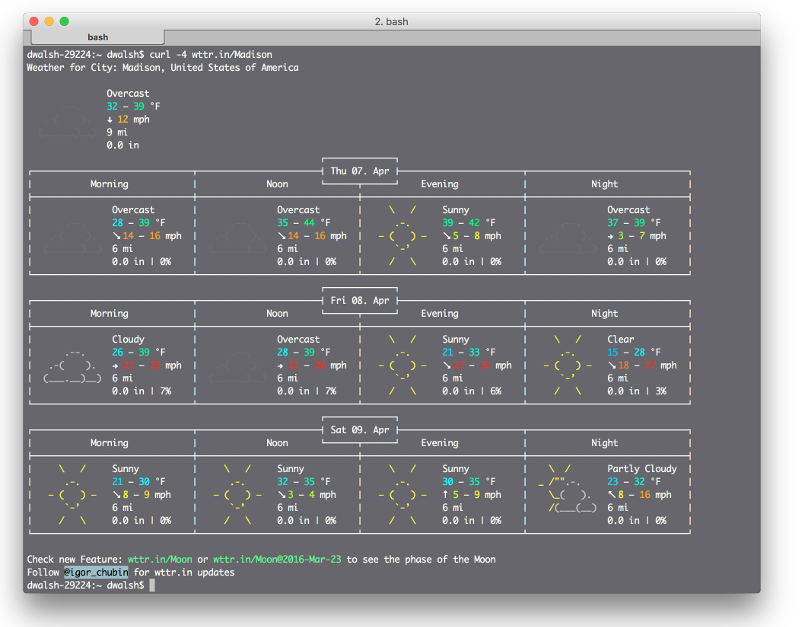Get Weather from Command Line
There's an awesome script making the rounds on Twitter and I've been as excited as everyone else so I thought I'd show it. Many of us live eight hours a day within the command line (although I'm not a vim hippie like some of you) so I try to find new ways to accomplish tasks from within iTerm (like getting bitcoin value or stock quotes). Many of these solutions include using cURL and this awesomeness is no exception!

You can get weather information from command line using cURL and wttr.in:
# Allow geolocation
curl -4 wttr.in
# Request a city
curl -4 wttr.in/Madison
wttr.in does well to guess location if one isn't provided so in most cases you wont need to provide your city.
There you go, another awesome way to get the information you need from command line!
![CSS @supports]()
Feature detection via JavaScript is a client side best practice and for all the right reasons, but unfortunately that same functionality hasn't been available within CSS. What we end up doing is repeating the same properties multiple times with each browser prefix. Yuck. Another thing we...
![39 Shirts – Leaving Mozilla]()
In 2001 I had just graduated from a small town high school and headed off to a small town college. I found myself in the quaint computer lab where the substandard computers featured two browsers: Internet Explorer and Mozilla. It was this lab where I fell...
![MooTools FontChecker Plugin]()
There's a very interesting piece of code on Google Code called FontAvailable which does a jQuery-based JavaScript check on a string to check whether or not your system has a specific font based upon its output width. I've ported this functionality to MooTools.
The MooTools...
![Highlight Table Rows, Columns, and Cells Using MooTools 1.2.3]()
Row highlighting and individual cell highlighting in tables is pretty simple in every browser that supports :hover on all elements (basically everything except IE6). Column highlighting is a bit more difficult. Luckily MooTools 1.2.3 makes the process easy.
The XHTML
A normal table. The cells...




Frickin’ genius!
This is excellent! As a relative rube when it comes to the command line though, can someone kindly explain the purpose of
-4in the command? I seem to get the same results whether I include it or leave it out.its used for Resolved name to IPv4 Address
It looks like iTerm here translates/renders the curl response HTML output? Or curl implicitly does that (if so what version of curl are you using)? Because the raw HTML (unprocessed) does not look as nicely displayed as the screenshot. Only if you render the HTML will it look like that.
I created an (OS X only) to automatically show your local weather:
https://gist.github.com/6343547a0169e9b6167d